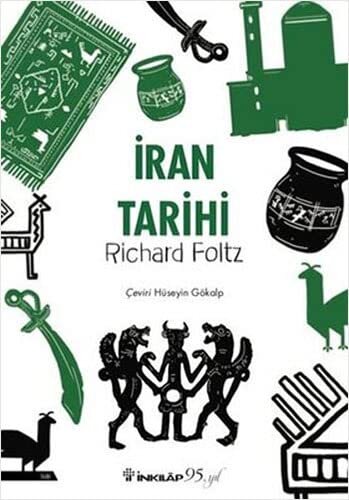“Iran in World History” published in Turkish

TEHRAN-The book “Iran in World History” written by Canadian scholar Richard Foltz has been published in Turkish.
Originally published in 2015 by Oxford University Press, the Turkish translation of the book has been done by Hüseyin Gökalp and İnkılâp Publishing House has released the book, IBNA reported.
A concise introduction that covers Iranian history from the beginnings to the present, the book provides a balanced treatment of successive historical periods rather than focusing on the ancient or modern period alone. It demonstrates the continuity throughout Iran's long history and emphasizes Iran's huge cultural influence throughout history.
Home of one of the world's most ancient and enduring civilizations, Iran has been at the nexus of world history for the past three thousand years. Situated at the crossroads between East and West, it has been marked by its encounters with other cultures and has influenced them with its own. From paradise gardens and Persian carpets to the mystical poetry of Rumi and Hafez, Iran's contributions have earned it a place among history's most refined and sophisticated societies.
In this book, Richard Foltz traces the spread of Iranian culture among diverse populations ranging from the Mediterranean to the Indian Ocean, and along the Silk Roads as far as China, from prehistoric times up to the present day. He emphasizes the range of contributions Iran has made to world history by highlighting the roles of key figures such as the ancient empire-builders Cyrus the Great and Darius I, the medieval polymath Avicenna, and early modern Mughal rulers such as Shah Jahan, who built India's celebrated Taj Mahal.
Iran originally referred to as Persia, has a long history of civilizations occupying not only the geographic, borders of modern Iran, but also a greater area of control during earlier Persian Empires, and an impact of Persian culture that spreads well beyond the boundaries of even the greatest civilizations that originated among the Persian peoples
Rather than providing a detailed political account of the various Iranian civilizations, the author mixes elements of history, politics, and cultural aspects of Iran’s different Empires and eras. Literature and belief systems are two focal areas in most of the chapters, as Foltz provides snippets of Iranian poetry or written works and a discussion of religion’s role in the region.
Initially discussing the prehistoric and ancient Iran, Foltz examines the migratory patterns that led to the peopling of the region and early regional civilizations such as the Elamites, Sakas, and Medes. He then discusses the development of Zoroastrianism in the region and how this religion had a significant impact on other monotheistic religions. Foltz next briefly reviews the history of the more familiar “Persian” Empires and lesser one.
Remaining chapters of the book focus on Iran’s Islamic era from the early Islamic conquests of Iran to the modern era. Foltz also examines the impact of Turkic and Mongol invasions on Iran history and the role of Iranians with these invaders. Russia’s and Britain’s impact on 18th through early 20th century Iran is examined, as well as Iran’s influence on European culture. Foltz ends his work focusing on the Pahlavi Dynasty. Throughout these last chapters, Foltz continues addressing the impact of Iran’s cultural history both in and outside of Iran.
Relatively well written and researched, Foltz uses a variety of primary and secondary sources to supplement his text. A chronology of the various Iranian civilizations is located after the last chapter, as well as suggested readings about the different Iranian era. Foltz also lists a variety of online resources that are available for researchers interested in the region and its history.
Foltz’s book is primarily aimed towards undergraduates and the general public; while the former can benefit from this work; individuals interested in learning about Iran’s history would find this book worth reading. Furthermore, individuals interested in learning about Iran could use this source to gain a broad and brief understanding of Iran’s historical importance and elements that shape modern Iran’s policies.
Encompassing religion, literature, the arts, and politics, “Iran in World History” offers a comprehensive history of one of the world's most influential civilizations and offers nuanced examples of its continuing role in the world today.
Richard Foltz, 62, is a cultural historian specializing in the broader Iranian world. He has also worked as a musician, film critic, and travel writer. He holds a Ph.D. from Harvard University and has taught at Brown, Columbia, and the University of Florida. He is currently a professor in the Department of Religions and Cultures at Concordia University in Montréal, Canada. His work has appeared in over a dozen languages.
İnkılâp Publishing House is one of the most prestigious and oldest publishing houses in Turkey. It has published more than 30,000 books in over 45 different subject areas.
SS/
